Andrew Furst's Blog, page 61
May 14, 2016
Nothing? – Say What?
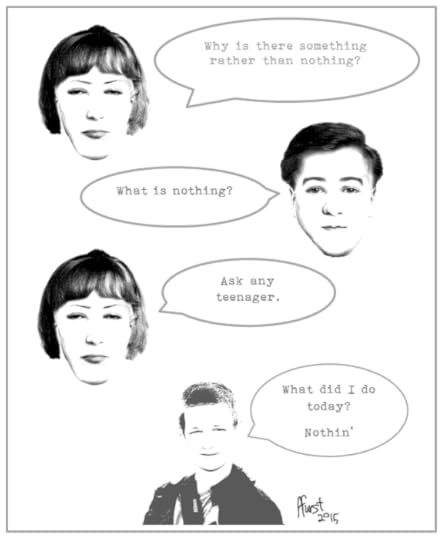
Say What? is an ongoing series of laconic exchanges on Buddhism in the format of a comic strip.
Get Each Week's "Say What?" Comic In Your Email Box
If you enjoyed this post, please like and share.
The post Nothing? – Say What? written by Andrew Furst appeared on Andrew Furst.
May 13, 2016
Modern Koans – Why Right Livelihood?
The Eightfold Path Series
This is the one of several posts I will be offering titled the Eightfold Path Series. As I've reflected on my experience, I've come to see the Path as both the practice and the fruition. As we inch closer to realization of our true nature, we discover that the wisdom, ethics, and mindfulness prescribed by the Buddha are the most natural expression of our being.
John Daido Loori Roshi's book Invoking Reality was transformational for me. In it Roshi turns the path on it's head in a way that uncovers it's challenge to us. The path and the precepts are not rules and regulations that lead to punishment by the karmic cosmos, but a way for us to see our true selves by looking through the prism of these personal dimensions. I see the path and the precepts as questions, not rules. Let's explore them.
Why Right Livelihood?
O ye who believe! Devour not usury, doubling and quadrupling (the sum lent). Observe your duty to Allah, that ye may be successful.
— Quran 3:130
Many religious texts offer detailed advice about our career choices. The Buddhist Sutras describe five types of businesses not to be undertaken
Business in weapons
Business in human beings
Business in meat
Business in intoxicants
Business in poison
The Bible and the Qu’ran have slightly different career guidance. The quotes displayed throughout the article are examples. While most of these recommendations are good advice, are they the best and most comprehensive advice? And are they relevant to the times?
For instance, consider being a soldier. Buddhism could be seen as a little vague on this. The precepts guide us to abstain from killing and the right livelihood prescription tells us that we should not trade in weapons. But does the precept to affirm life imply we shouldn’t be soldiers? Not all soldiers kill. Some do, but only indirectly. What is the right answer?
Do not practice divination or seek omens
Leviticus 19:26
The Bible can also be seen as a little vague on this. There is the commandment to not kill. Yet God and the armies of the Israelites smite their way through the centuries. St Augustine made an argument for just war.
My feeling is that religious livelihood doctrine is not entirely prescriptive. Don’t get me wrong, applying them as rules to live by wouldn’t be the worst thing you could do. But I think a deeper dive gives us an opportunity for a richer experience. Right livelihood is an invitation for the religious practitioner to apply their precepts and principles to the present moment. In the case of livelihood, we can cultivate as we earn a living.
Can one be a soldier and keep the precepts and right livelihood? Probably.
Click To Tweet
So let’s push the envelope on right livelihood. Consider the armed forces. Can one be a soldier and keep the precepts and right livelihood? Probably. Consider a medic or a chaplain. It gets fuzzy quickly with these edge cases. Welcome to Buddhism!
Fuzzy
Many Buddhist ideas can be puzzling when you think them through. Consider oneness. What does it mean to be one with the universe? One might expect to share a significant amount of experience with anything that is inseparable from us. If I’m one with you, shouldn’t I feel your pain and likewise? If someone hits me, do you feel it? No. We have to develop a nuanced understanding of oneness which has practical limits. MIndfulness is how we get at the nuance.
If I'm one with the universe, shouldn't I feel your pain and likewise?
Click To Tweet
As we fiddle around with the idea of who we are, there is the question of where one individual begins and everything else ends. There is some fuzziness when we look at the boundary. It tells us there are limits to our connections and that there is some context involved. The boundaries are porous, but they do exist.
Physically we exchange energy and nutrients from our environment. We use sunlight to create vitamin D, We breathe in oxygen and exhale carbon dioxide. But it’s also true that our nervous systems are distinct from those of the people around us. We have no mechanism to directly detect the sensations and mental activity of others,
On another level we have language and the ability to read the emotions of others through body language, voice tone, eye contact, etc. We have close connections to family, friends, and partners. We’re also deeply dependent on a very large network of people who we have no direct connection. We’re reliant upon the stability of the ecosystem, the sun, and the relatively safe harbor our corner of the galaxy provides.
So in what context do we view right livelihood?
Let’s go back to the case of an Army Medic. In one sense it seems contrary to the intention of the eightfold path to seek employment in the armed forces. But there is no doubt in my mind that being a medic is an important way to serve others. So do we have to get more granular with the rules? Can we derive more guidance with a more detailed exegesis of the sutras? Maybe, but I don’t think that is where the Buddha was going with this.
Ethical Work is complicated because:
Much of who we are is related to our profession – We spend much of our lives at work. A good amount of our identity is in our profession. We find pleasure when we do something we like. Buddhism is about a fully integrated life. If we only choose to live mindfully when we’re off the clock, we’re missing the point. By acknowledging the need for ethical work the Buddha is reminding us that there is no part of our life where we won’t benefit from mindlessness.
If we only choose to live mindfully when we're off the clock, we're missing the point.
Click To Tweet
It’s not about choosing and forgetting – The eightfold path is not a checklist. We don’t stop suffering once we choose a noble profession. We must live it out fully, by making mistakes and recovering, over and over again. We don’t get it right and call it a day. The alarm clock will go off another day and we have to do it again, and again, and again.
We don't stop suffering once we choose a noble profession.
Click To Tweet
It’s in context to suffering – Everything that the Buddha taught us was about decreasing our suffering by waking up to greed, hatred, and confusion. It’s about being mindful of the choices we make every day. It’s about recognizing our propensity to think small and the dissatisfaction that follows. Having an ethical profession doesn’t prevent you from being selfish, but it can put you in more situations where you can make good choices and sow the seeds of an enriching satisfying life.
I'd love to hear your thoughts in the comments below.
Modern Koans is an ongoing series that recognizes that good questions are often more important then their answers.
The riddles of God are more satisfying than the solutions of man. ― G.K. Chesterton
Get Each Week's Modern Koans In Your Email Box
If you enjoyed this post, please like and share.
The post Modern Koans – Why Right Livelihood? written by Andrew Furst appeared on Andrew Furst.
May 12, 2016
Nathaniel Hawthorne On Happiness – Quotes
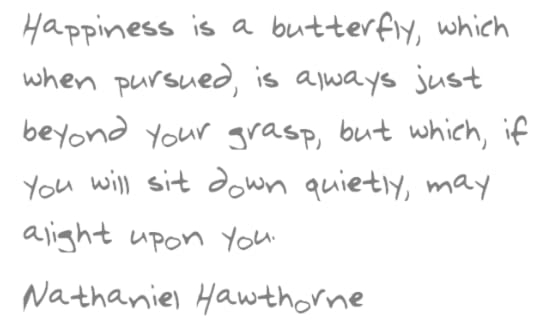
Quotes -The path to right view is an arduous walk through fields of manure.
Get Each Week's Quotes In Your Email Box
If you enjoyed this post, please like and share.
The post Nathaniel Hawthorne On Happiness – Quotes written by Andrew Furst appeared on Andrew Furst.
Lower Chapel Falls – A Two Minute Meditation
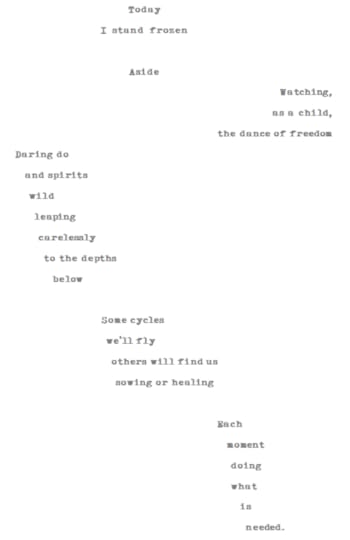
If you enjoyed this post, please like and share.
Minute Meditations is an ongoing series of short videos, poems, and commentary intended as a meditation. Offered as an opportunity to step back from your cyber routine and settle into a more natural rhythm, if only for a minute.
Get Each Week's Minute Meditations In Your Email Box
These videos are produced for those of us who spend an inordinately large amount of time in the cyber-world. They are not a substitute for unplugging from your devices and taking a stroll near trees, water, or a patch of unkempt grass. Getting out into the world - touching, smelling, hearing, and seeing nature is the best way to reconnect with our prime purpose.
What is our prime purpose? We are feeling and sensing machines. We are the universe looking back on itself. We are witness to the wonders and dangers of living in this corner of the cosmos. We are the seekers looking for connection a little further beyond yesterday's borders and boundaries.
But sitting and staring at the screen robs us of the sustenance that we rely upon for wonder and sanity. These videos are an opportunity to bring the sensations of nature to you, while you're in the cyber-world. Its an opportunity to relax your gaze, resettle your posture, and regain some depth in your breath. Listen and watch the video and allow your self to open up and recharge.
The post Lower Chapel Falls – A Two Minute Meditation written by Andrew Furst appeared on Andrew Furst.
May 11, 2016
Graffitti- Tiny Drops (Photography)
Click on an image below to view in the lightbox
 Graffitti
Graffitti NOAH2
NOAH2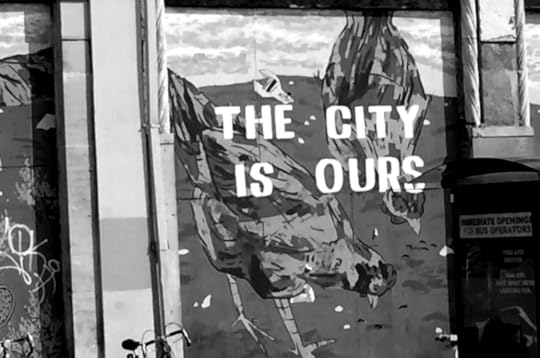 The City is Ours bw
The City is Ours bwGet Each Week's Tiny Drops In Your Email Box
All Tiny Drop photos Attribution-NonCommercial-ShareAlike 4.0 International (CC BY-NC-SA 4.0)
If you enjoyed this post, please like and share.
The post Graffitti- Tiny Drops (Photography) written by Andrew Furst appeared on Andrew Furst.
May 10, 2016
The Chanpa Flower by Rabindranath Tagore – Compass Songs
Supposing I became a chanpa flower, just for fun, and grew on a
branch high up that tree, and shook in the wind with laughter and
danced upon the newly budded leaves, would you know me, mother?
You would call, “Baby, where are you?” and I should laugh to
myself and keep quite quiet.
I should slyly open my petals and watch you at your work.
When after your bath, with wet hair spread on your shoulders,
you walked through the shadow of the champ tree to the little court
where you say your prayers, you would notice the scent of the
flower, but not know that it cane from me.
When after the midday meal you sat at the window reading
ramayana, and the tree’s shadow fell over your hair and your lap,
I should fling my wee little shadow on to the page of your book,
just where you were reading.
But would you guess that it was the tiny shadow of your
little child?
When in the evening you went to the cow shed with the lighted
lamp in your hand I should suddenly drop on to the earth again and
be your own baby once more, and beg you to tell me a story.
“Where have you been, you naughty child?”
“I won’t tell you, mother.” That’s what you and I would say
then.
Compass Songs is an ongoing series of works by poets that I enjoy. Poetry, as the Zen Masters have said, is like a finger pointing to the moon. It speaks the unspeakable.
Get Each Week's Compass Song In Your Email Box
If you enjoyed this post, please like and share.
The post The Chanpa Flower by Rabindranath Tagore – Compass Songs written by Andrew Furst appeared on Andrew Furst.
May 9, 2016
My Got-It-Togetherness Graph – Dialectic Two Step
Estimated reading time: 4 minute(s)
Comment: The other day, my wife was telling me a story of a friend’s mother who recently had some perspective delivered in the form of a stroke. The friend apparently mentioned that maybe she should spend more time hanging out with me, I was a little puzzled. I asked “What would I have to offer?” She smiled, and in that way only a wife can, reminded me that – being a “Buddhist guy” – many people think that I must have it all together.
Response: Ha! My thoughts on this can be summed up nicely in the following graph.
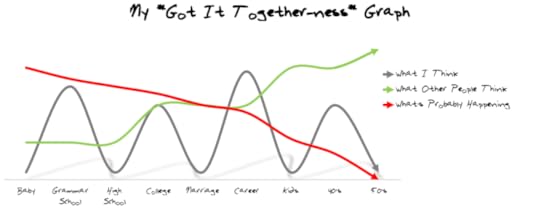
I’d only add that so much of what the Buddha teaches tells us that having it together is not what its all about. So many of the teachings – impermanence, thusness, Metta, suffering, and so on – start from where we are the most imperfect and don’t move very far from there. Not only that, the Buddha doesn’t teach us about ending up on top of the world, but being right where we are in the world, right now. Striving for and arriving at some future perfect state is just another recipe for suffering.
So, for those of you with the belief that we Buddhists somehow have a special stash of “Got-It-Togetherness”, you can let go of that idea right now.
Dialectic Two-Step is an ongoing series of my thoughts on questions that come my way.
Wisdom lies neither in fixity nor in change, but in the dialectic between the two. - Octavio
Get Each Week's Dialectic Two Step In Your Email Box
If you enjoyed this post, please like and share.
The post My Got-It-Togetherness Graph – Dialectic Two Step written by Andrew Furst appeared on Andrew Furst.
May 8, 2016
Gloomy Saints – Quotes

Quotes -The path to right view is an arduous walk through fields of manure.
Get Each Week's Quotes In Your Email Box
If you enjoyed this post, please like and share.
The post Gloomy Saints – Quotes written by Andrew Furst appeared on Andrew Furst.
Gratitude Under The Microscope – Meditations on Gratitude
Humans are an ungrateful bunch. That’s not so much a judgement as an observation. Given our busy lives, it feels impossible to slow down enough to pay respect to everyone and everything that deserves our appreciation.
it feels impossible to slow down enough to pay respect to everyone and everything that deserves it.
Click To Tweet
I have a friend, Tim Swallow, who is a traditional Lakota holy man. He moves at what we jokingly refer to as Indian time. It is a much more natural pace. It is rich with appreciation and wonder. But in many ways he stands apart from life as most of us know it. This creates many challenges for him and his family. He undergoes hardships that most of us could not endure, and many might judge him as irresponsible for choosing that life.
Most of the world’s monastic traditions have roles for people like Tim, who hear the call of a life of wholeness that comes from a deep connection to Nature or God. In a sense these unique people strike a balance in the world, serving as reminders that there are other important things in life.
The rituals performed in these traditions are steeped in awareness and gratitude; taking notice of the gifts of life and acting out of stewardship and appreciation.
Gratitude Under The Microscope
Steven Pinker in his book “Better Angels of Our Nature” explores several theories of morality including the relational models theory. This theory describes several dimensions and contexts to our sense of right and wrong, and our obligations to others. These include:
Communal Sharing – acting with an appropriate balance of cooperation and deterrents to maintain harmony within a particular group. Actions are performed without the expectation of reciprocation.
Authority Ranking – acting with an acknowledgement of the need for authority to maintain harmony
Equality Matching – acting our of fairness, for example taking turns, sharing responsibilities, etc.
Market Pricing – fairness in the economic world, like fair wages, pricing, and interest rates.
These contexts are important in understanding how humans tend to structure their gratitude. Let’s use an example and to tease out two very important points. In the exercise I enumerate the relationships that I rely upon to get out the door in the morning. For each step in my morning routine, I’m going to list some of the relationships that I depend on and their type.
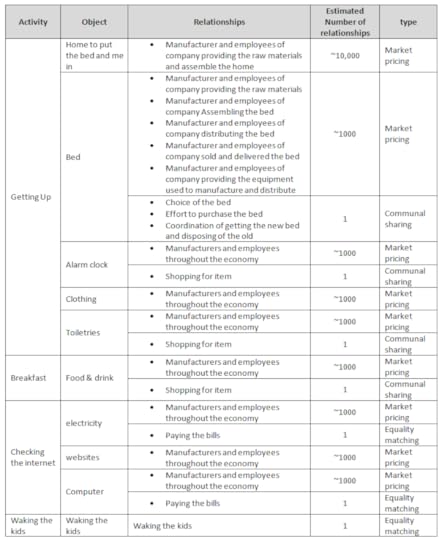
The points I want to make are:
Our interdependence runs very deep. We see this in the vast quantity of relationships that we have across all of these relational types
Our appreciation can often be blunted or dismissed based on the context
Our interdependence runs very deep... Our appreciation can often be blunted
Click To Tweet
In this exercise, I’ve estimated there are 18,001 relationships that I rely on to traverse the first hour of my day. This first fact is illuminating. We are dependent upon so many people.
The second point that I’ll make is about how we allot our gratitude. My inclination is to think that If I paid a fair market price for any of the purchased items on the list, I’ve fulfilled my duty and moral obligation. I think that is mostly right, but it is also true that it takes some of the wind out of the sails of the rugged individualist ideal that many of us have about our place in the world. Even if you live in a log cabin in the woods that you built with your bare hands, you are still relying on a history of house design to build it. There are countless dependencies there too.
Another observation is the difference in how one single relationship (with my wife) is conducted. You’ll note that I classified that relationship in two ways – communal and equality matching. Our communal relationship is the domain of tasks that each of us take on based on our personal capabilities or roles. We both do the shopping, and we do it with no accounting of who does more of it. But there are some tasks in our relationship which we consciously or unconsciously track and expect reciprocation. My wife handles the money, because she’s better at it, but I put gas in the cars, because I’m better at it. There is an unspoken contract that these tasks fit into our roles based on reciprocation.
It’s also interesting to note that in my mind, I feel a great deal more appreciation for my wife’s role in my life than the people who cut the trees down that framed my house. There are many good reasons for that, but to be honest, until I wrote the last sentence, I don’t think I’ve ever considered those tree cutters before.
It is worthwhile from time to time to reflect on how dependent we are on others
Click To Tweet
Science is providing a great deal of insight on how humans view and transact our moral obligations. The Buddha taught acceptance. I don’t read into these observations a need to change the way we express gratitude in our relationships, but I do think that it is worthwhile from time to time to reflect on how dependent we are on others. This will instill a deeper sense of gratitude and increase our wisdom and compassion. This has the knock on effect of allowing us to be more present in our relationships. Imagine that.
Meditations on Gratitude - A weekly series of people and situations I’m thankful for and a short meditation.
Get Each Week's Meditations on Gratitude In Your Email Box
If you enjoyed this post, please like and share.
The post Gratitude Under The Microscope – Meditations on Gratitude written by Andrew Furst appeared on Andrew Furst.
May 7, 2016
A Journey of a Thousand Steps? – Say What?
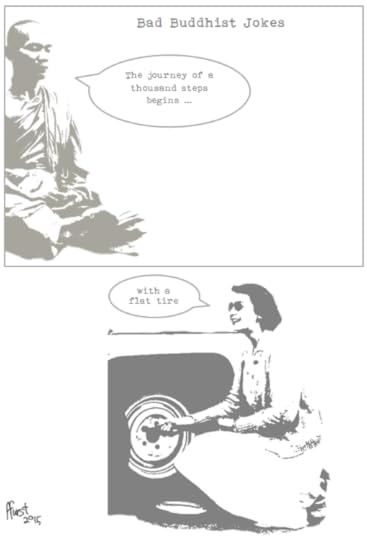
Say What? is an ongoing series of laconic exchanges on Buddhism in the format of a comic strip.
Get Each Week's "Say What?" Comic In Your Email Box
If you enjoyed this post, please like and share.
The post A Journey of a Thousand Steps? – Say What? written by Andrew Furst appeared on Andrew Furst.




